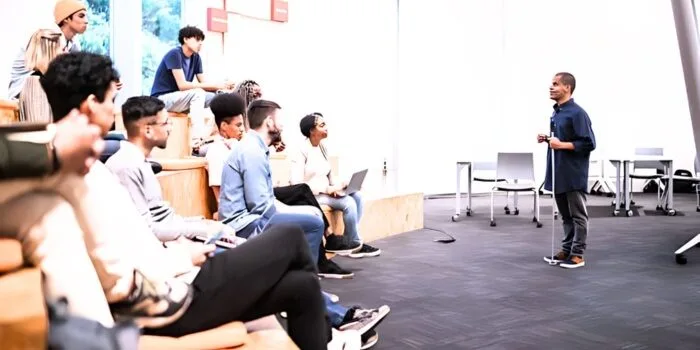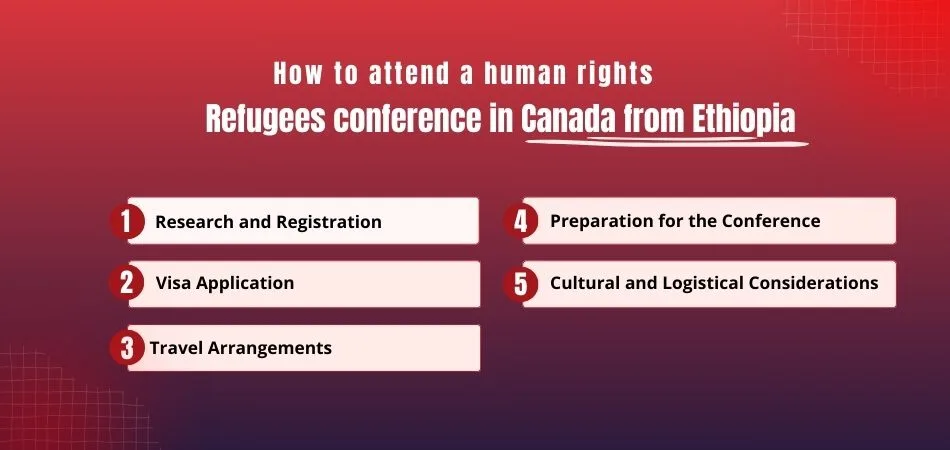Attending a Human Rights and Refugees Conference in Canada from Ethiopia is an exciting opportunity to engage in critical global discussions. Whether you’re an advocate, a scholar, or simply passionate about these issues, attending such events can broaden your perspective and expand your network.
But how do you attend a Human Rights and Refugees Conference in Canada from Ethiopia To begin, you’ll need to secure an invitation or register for the event. After that, focus on getting a Canadian visa, preparing travel documents, and exploring possible funding options.
Excited to learn more? Continue reading for a detailed guide on managing the process step-by-step and making your international conference experience a success.
Human Rights and Refugees Conference: What is it?
A Human Rights and Refugees Conference is a global platform that brings together activists, policymakers, scholars, and advocates to discuss critical issues related to human rights and the refugee crisis. These conferences offer a space for meaningful dialogue, collaboration, and the exchange of ideas to address ongoing challenges.
If you’re seeking a Human Rights and Refugees Conference to attend, participants often explore topics such as displacement, asylum policies, and the protection of refugees’ rights. Through panel discussions, workshops, and networking events, attendees gain valuable insights into the latest global trends, laws, and humanitarian efforts aimed at improving the lives of refugees.
Such conferences also highlight the need for collaboration between governments, NGOs, and individuals. Speakers often include experts, survivors, and leaders who share their experiences and strategies for overcoming challenges in the field of human rights.
For those passionate about justice and equality, attending a Human Rights and Refugees Conference can be both educational and inspiring. It empowers participants to take action and influence positive change in their communities and beyond.
By attending, you become part of a larger global movement dedicated to safeguarding the rights and dignity of refugees. These conferences create opportunities to network, learn, and contribute to the evolving conversation on human rights.
How to Attend a Human Rights and Refugees Conference in Canada from Ethiopia?
Attending a Human Rights and Refugees Conference in Canada from Ethiopia is a journey that requires careful planning and preparation.
For those passionate about human rights and refugee issues, such a conference offers a valuable platform to learn, network, and contribute to global discussions. Now then the query of how to attend a human rights and refugees conference in Canada from Ethiopia? For those kinds of people.
To begin this journey, one must maneuver the steps of researching the conference, securing a visa, arranging travel, and preparing for participation. By following a structured approach, Ethiopians can successfully attend a human rights and refugees conference in Canada and make the most of this enriching experience.
Step 1: Identify the Right Conference
First, you’ll need to research and identify a Human Rights and Refugees Conference in Canada that aligns with your interests. There are several such conferences held annually, and each may focus on different aspects of human rights and refugee issues.
Look for conferences that offer themes, speakers, and topics that inspire you. Websites, social media, and organizations like the UNHCR and Amnesty International are great places to start your search.
Step 2: Secure an Invitation or Register
Once you’ve identified the conference you’d like to attend, the next step is to secure an invitation or register for the event. Additionally, participating in Human Rights and Refugees Conference discussions often requires securing a slot, especially if you plan to present a paper or be part of a panel.
Carefully follow the registration or application guidelines on the event’s website. Make sure to meet all deadlines, as spaces at these conferences can fill up quickly. If the conference offers scholarships or financial aid, this is the time to apply for those as well.
Step 3: Apply for a Canadian Visa

Begin by visiting the official website of the Canadian Embassy in Ethiopia to understand the specific requirements. Typically, you’ll need:
- A valid passport
- Proof of conference registration or invitation
- Proof of sufficient funds to cover your trip
- A letter from your employer or academic institution (if applicable)
- Travel itinerary and accommodation details
- A completed visa application form
- Payment of the visa fee
Submit your application online or in person at the Canadian Embassy in Addis Ababa. Processing times can vary, so ensure you apply well in advance of your planned travel date.
Step 4: Organize Your Travel and Accommodation
Once your visa is approved, the next step is to book your flights and accommodation. It’s a good idea to look for flights as early as possible, as prices tend to rise closer to the departure date.
Direct flights from Ethiopia to Canada may not be available, so plan for layovers and choose the most convenient and affordable options.
For accommodation, many conferences provide information on hotels near the venue, sometimes with special rates for attendees. You can also explore other options like Airbnb if you’re looking for a more personalized stay. Be sure to finalize these arrangements well in advance to avoid last-minute stress.
Step 5: Explore Funding and Scholarships
Attending an international conference can be expensive, but there are funding options available to help offset the costs. Many conferences offer travel grants or scholarships to participants from developing countries like Ethiopia.
Look into these opportunities when you register for the event. Additionally, reach out to your academic institution, NGO, or employer to see if they offer any sponsorship or support for attending conferences.
If you’re an academic or a student, some institutions provide grants for research and international travel. Be proactive and apply for as many relevant funding options as possible.
Step 6: Prepare for the Conference
Before you head to Canada, take some time to prepare for the conference. Review the agenda, familiarize yourself with the speakers and topics, and think about how you want to engage during the event.
Whether you’re attending workshops, networking with professionals, or giving a presentation, preparation is key to making the most of your experience. Bring plenty of business cards, if possible, and be ready to introduce yourself to fellow attendees.
Networking is one of the most valuable aspects of attending an international conference, so make the most of every opportunity to connect with others who share your passion for human rights and refugee issues.
Step 7: Make an Impact Post-Conference
Once the conference is over and you’ve returned to Ethiopia, it’s time to reflect on what you’ve learned and how you can apply it to your work or advocacy efforts.
Share your insights with your colleagues, write a blog post, or give a presentation about your experience. The knowledge and connections you’ve gained can help you make a meaningful impact in your community.
Additionally, keep in touch with the people you met at the conference. Building a network of like-minded individuals can open doors to future collaborations and opportunities.
By following these steps, Ethiopians can successfully attend a human rights and refugees conference in Canada, gaining valuable insights and contributing to the global discourse on these critical issues.
Who Can Attend a Human Rights and Refugees Conference?
Being part of a Human Rights and Refugees Conference is an eye-opening experience, drawing a diverse group of individuals and organizations committed to making a difference.
These attendees come from various backgrounds, each bringing unique perspectives and expertise to the table.
Human Rights Advocates
Human rights advocates are at the forefront of these conferences. They include activists, lawyers, and researchers dedicated to defending and promoting human rights.
Their work often involves campaigning for policy changes, providing legal assistance to victims of human rights abuses, and raising awareness about pressing issues.
Refugee Representatives
Refugees themselves play a crucial role in these conferences. Their firsthand experiences and stories provide invaluable insights into the challenges faced by displaced communities. They remind us of the human impact behind statistics and reports.
Government Officials
Government representatives from various countries attend to discuss and develop strategies for addressing human rights and refugee issues. Their participation is crucial for implementing international agreements and ensuring that national policies align with global human rights standards.
Non-Governmental Organizations (NGOs)
NGOs are key players in the field of human rights and refugee support. They work on the ground, providing aid and assistance to affected populations. At conferences, they share their experiences, network with other organizations, and seek support for their initiatives.
Academics and Researchers
Scholars specializing in human rights, international law, and refugee studies contribute their knowledge and research findings. They offer a theoretical framework for understanding the complex issues at hand and propose evidence-based solutions.
United Nations and International Agencies
Representatives from the United Nations and other international agencies, such as the UNHCR (United Nations High Commissioner for Refugees), are regular attendees. They play a pivotal role in coordinating global efforts and providing support to countries dealing with large refugee populations.
Philanthropists and Donors
Philanthropists and donors interested in supporting human rights and refugee causes attend to learn about the latest developments and find opportunities to contribute financially. Their support is vital for funding projects and initiatives that make a tangible difference.
Media and Journalists
Media professionals and journalists cover these conferences to bring attention to the issues discussed and amplify the voices of those affected. Their reporting helps raise public awareness and can influence policy decisions.
Students and Volunteers
Students and volunteers passionate about human rights and social justice are often present, and eager to learn and contribute. These conferences offer them a chance to gain valuable insights and connect with experienced professionals in the field.
To recap, a Human Rights and Refugees Conference is a place where people and organizations come together for a common cause: to protect and uphold the rights and dignity of all people, especially those forced to flee their homes. Each attendee plays a vital role in the collective effort to address and resolve these global challenges.
Benefits of Attending a Human Rights and Refugees Conference in Canada from Ethiopia
Attending a Human Rights and Refugees Conference in Canada from Ethiopia offers a unique opportunity to be part of a global conversation on some of the most pressing issues facing our world. It’s not just about learning—it’s about taking action, building networks, and being a voice for change. Here are some of the key benefits.
Global Networking Opportunities
Participating in a conference of this scale connects you with policymakers, advocates, academics, and practitioners from around the world.
These connections can open doors to collaborations, future projects, and a supportive community of like-minded individuals who are equally passionate about human rights and refugee advocacy.
Improved Knowledge and Awareness
Attending the conference provides first-hand exposure to the latest trends, policies, and solutions surrounding human rights and refugee crises.
You’ll gain insights from global experts, hear real-life stories from the ground, and understand the broader impacts of these issues on a global scale. This deeper knowledge empowers you to be more effective in your work back in Ethiopia.
Professional and Personal Growth
Whether you’re presenting your research, participating in discussions, or simply absorbing knowledge, attending a conference like this contributes to both your professional and personal growth.
Moreover, joining Human Rights and Refugees Conferences in Canada helps you build confidence, sharpen your communication skills, and strengthen your ability to advocate for issues that matter.
Opportunities for Advocacy and Action
The conference is not just a learning platform—it’s a place to take action. Many conferences offer workshops and sessions where participants can strategize and develop solutions for pressing issues.
These experiences equip you with the tools to make a difference in your own community upon returning to Ethiopia.
Increased Visibility and Recognition
For those presenting research or projects, this is a valuable opportunity to gain visibility on an international stage. It allows you to showcase your work and ideas, making an impact beyond your immediate community.
Attending a Human Rights and Refugees Conference in Canada from Ethiopia is a transformative experience, giving you the chance to grow, connect, and be part of something bigger than yourself.
FAQs
This trip can raise several questions, especially regarding the application and visa process. Here are some frequently asked questions and their answers to help you manage the journey.
How can I find the right Human Rights and Refugees Conference to attend in Canada?
Research upcoming conferences through reputable platforms such as event websites, academic institutions, or organizations like the UNHCR. Look for conferences that focus on topics of interest to you, then check registration details and deadlines to secure your spot.
Can I apply for funding to attend a conference in Canada?
Yes, many conferences offer scholarships or travel grants for attendees, especially from developing countries. You can also explore funding options through your academic institution, NGO, or employer. Apply early, as funding opportunities are often limited and competitive.
Can I work or study in Canada while attending a conference?
No, attending a conference on a visitor visa does not allow you to work or study in Canada. The visa permits you to participate in the conference and engage in related activities, but any employment or formal study would require different visa types.
How long should I plan to stay in Canada for the conference?
Check the conference schedule to determine the length of the event, and consider adding a day or two for travel and potential networking opportunities. Typically, conferences last two to five days, but planning a flexible schedule ensures you make the most of your trip.
Can I attend a Human Rights and Refugees Conference in Canada without an invitation?
No, most conferences require either an invitation or registration. Some conferences may request participants to submit an abstract or application beforehand. Ensure you meet any specific requirements the conference may have and register within the deadlines to secure your spot.
Are there any specific health requirements to enter Canada from Ethiopia?
Yes, you should review Canada’s entry requirements for vaccinations or health guidelines. Currently, there are no mandatory vaccinations for Ethiopian travelers, but having travel insurance is highly recommended in case of medical emergencies during your stay in Canada.
Final Thought
Attending a Human Rights and Refugees Conference in Canada from Ethiopia can be a life-changing experience, allowing you to engage with global leaders and make a real impact. By following the right steps, from securing an invitation to obtaining your visa, you can make this dream a reality.
The journey may seem challenging, but with careful planning and the right resources, you can navigate the process smoothly. Remember to explore funding options, prepare all necessary documents, and give yourself ample time for each step.
Now that you know how to attend a Human Rights and Refugees Conference in Canada from Ethiopia, it’s time to take the first step. The opportunity to contribute to global discussions on human rights and refugee issues is within your reach. Go for it!







